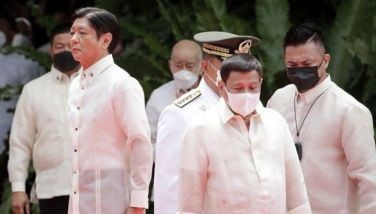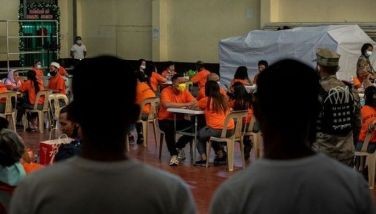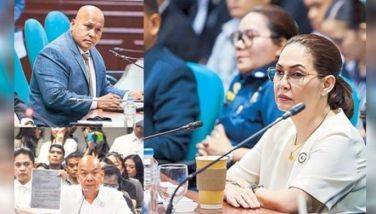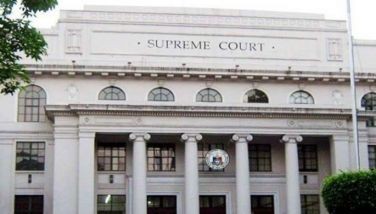Expanded coverage of gov’t ID mulled
April 21, 2006 | 12:00am
CEBU CITY — Malacañang indicated yesterday plans to expand the scope and coverage of the current identification (ID) system to better distinguish suspected criminals and terrorists from law-abiding citizens.
Speaking to reporters at the counterterrorism meet here, Executive Secretary Eduardo Ermita said "probably if we reach that point" when the government enacts a law implementing a national ID system covering all Filipinos, only then would it be "useful against criminality and terrorism."
At Malacañang, President Arroyo ordered the Cabinet to get the unified ID system on track as the government allayed fears of human rights violations in the implementation of the program.
Press Secretary Ignacio Bunye said the Palace acknowledges and appreciates the Supreme Court decision not only for its contribution to national security but also for its effects in facilitating the delivery of vital programs and services to the people.
"Every strong and progressive nation has a national ID system in one form or another and this is the way we can keep up with the rest of the world," Bunye said.
Presidential chief of staff Mike Defensor said the guidelines for the government ID system could be ready by middle of next month.
The unified ID system, which the Supreme Court declared as constitutional Wednesday, will not cover driver’s licenses because it is an ID often confiscated from among the thousands of motorists traveling daily, the Land Transportation Office (LTO) said.
LTO chief Assistant Secretary Anneli Lontoc said this has been discussed with government bodies that will implement the unified ID system.
Lontoc noted the reference number that will be issued under the ID system would also be included on the driver’s license.
Voting 12-2, the Supreme Court upheld the constitutionality of Executive Order 420 issued by President Arroyo last year, requiring all government agencies and government-owned and -controlled corporations to streamline and merge their respective identification systems into one ID system.
Malacañang sought to assuage fears over the implementation of the unified ID system.
Ermita said there should be no apprehensions for this in its current setup, as it is not a security scheme to flush out suspected criminals and terrorists.
"The national ID system is really, for the moment, to facilitate the administrative aspects of people in government, especially in transacting business with government agencies," Ermita told reporters.
"It is hardly the national ID system the people thought it was which covers everyone," he stressed.
Ermita was in Cebu to address the first Counter-Terrorism Experts Conference where some 500 delegates and representatives from more than 50 countries attended the three-day meeting that aims to find a "middle way" on fighting terror.
Philippine National Police Deputy Director General Avelino Razon said once a national ID system is fully implemented, "terrorists would lose their anonymity."
He said suspected foreign terrorists entering the country are now harder to detect, especially members of the al-Qaeda-linked Jemaah Islamiyah, which operate in Southeast Asia, as they share similar physical features with Filipinos.
Opponents of EO 420, mostly left-leaning groups, lodged separate petitions with the Supreme Court, arguing that the ID system was virtually a national ID system which infringed on individuals’ right to privacy and that only Congress had the power to establish a national ID system.
But in its decision, the High Tribunal said EO 420 did not infringe on the public’s right to privacy and that Mrs. Arroyo had not usurped legislative power.
The Supreme Court explained the presidential order "makes only the existing sectoral card systems of government entities like the Government Service Insurance System, PhilHealth and Land Transportation Office less costly, more efficient, reliable and user-friendly to the public."
It also argued that EO 420 applies only to government agencies that already maintain ID systems and issue ID cards pursuant to their regular functions under existing laws.
The court also noted that the EO limited the information to be collected to 14 specific items, particularly name, home address, sex, picture, signature, date of birth, place of birth, marital status, name of parents, height, weight, two index fingerprints and two thumb marks, any prominent distinguishing features like moles or others and tax identification number.
"These limited and specific data are the usual data required for personal identification by government entities, and even by the private sector. Anyone who applies for or renews a driver’s license provides to the (Land Transportation Office) all these 14 specific data," the court said.
It added that the LTO and some other government offices require even more information. — Paolo Romero, Aurea Calica, Sandy Araneta
Speaking to reporters at the counterterrorism meet here, Executive Secretary Eduardo Ermita said "probably if we reach that point" when the government enacts a law implementing a national ID system covering all Filipinos, only then would it be "useful against criminality and terrorism."
At Malacañang, President Arroyo ordered the Cabinet to get the unified ID system on track as the government allayed fears of human rights violations in the implementation of the program.
Press Secretary Ignacio Bunye said the Palace acknowledges and appreciates the Supreme Court decision not only for its contribution to national security but also for its effects in facilitating the delivery of vital programs and services to the people.
"Every strong and progressive nation has a national ID system in one form or another and this is the way we can keep up with the rest of the world," Bunye said.
Presidential chief of staff Mike Defensor said the guidelines for the government ID system could be ready by middle of next month.
The unified ID system, which the Supreme Court declared as constitutional Wednesday, will not cover driver’s licenses because it is an ID often confiscated from among the thousands of motorists traveling daily, the Land Transportation Office (LTO) said.
LTO chief Assistant Secretary Anneli Lontoc said this has been discussed with government bodies that will implement the unified ID system.
Lontoc noted the reference number that will be issued under the ID system would also be included on the driver’s license.
Voting 12-2, the Supreme Court upheld the constitutionality of Executive Order 420 issued by President Arroyo last year, requiring all government agencies and government-owned and -controlled corporations to streamline and merge their respective identification systems into one ID system.
Malacañang sought to assuage fears over the implementation of the unified ID system.
Ermita said there should be no apprehensions for this in its current setup, as it is not a security scheme to flush out suspected criminals and terrorists.
"The national ID system is really, for the moment, to facilitate the administrative aspects of people in government, especially in transacting business with government agencies," Ermita told reporters.
"It is hardly the national ID system the people thought it was which covers everyone," he stressed.
Ermita was in Cebu to address the first Counter-Terrorism Experts Conference where some 500 delegates and representatives from more than 50 countries attended the three-day meeting that aims to find a "middle way" on fighting terror.
Philippine National Police Deputy Director General Avelino Razon said once a national ID system is fully implemented, "terrorists would lose their anonymity."
He said suspected foreign terrorists entering the country are now harder to detect, especially members of the al-Qaeda-linked Jemaah Islamiyah, which operate in Southeast Asia, as they share similar physical features with Filipinos.
Opponents of EO 420, mostly left-leaning groups, lodged separate petitions with the Supreme Court, arguing that the ID system was virtually a national ID system which infringed on individuals’ right to privacy and that only Congress had the power to establish a national ID system.
But in its decision, the High Tribunal said EO 420 did not infringe on the public’s right to privacy and that Mrs. Arroyo had not usurped legislative power.
The Supreme Court explained the presidential order "makes only the existing sectoral card systems of government entities like the Government Service Insurance System, PhilHealth and Land Transportation Office less costly, more efficient, reliable and user-friendly to the public."
It also argued that EO 420 applies only to government agencies that already maintain ID systems and issue ID cards pursuant to their regular functions under existing laws.
The court also noted that the EO limited the information to be collected to 14 specific items, particularly name, home address, sex, picture, signature, date of birth, place of birth, marital status, name of parents, height, weight, two index fingerprints and two thumb marks, any prominent distinguishing features like moles or others and tax identification number.
"These limited and specific data are the usual data required for personal identification by government entities, and even by the private sector. Anyone who applies for or renews a driver’s license provides to the (Land Transportation Office) all these 14 specific data," the court said.
It added that the LTO and some other government offices require even more information. — Paolo Romero, Aurea Calica, Sandy Araneta
BrandSpace Articles
<
>
- Latest
- Trending
Trending
Latest
Trending
Latest
Recommended



























